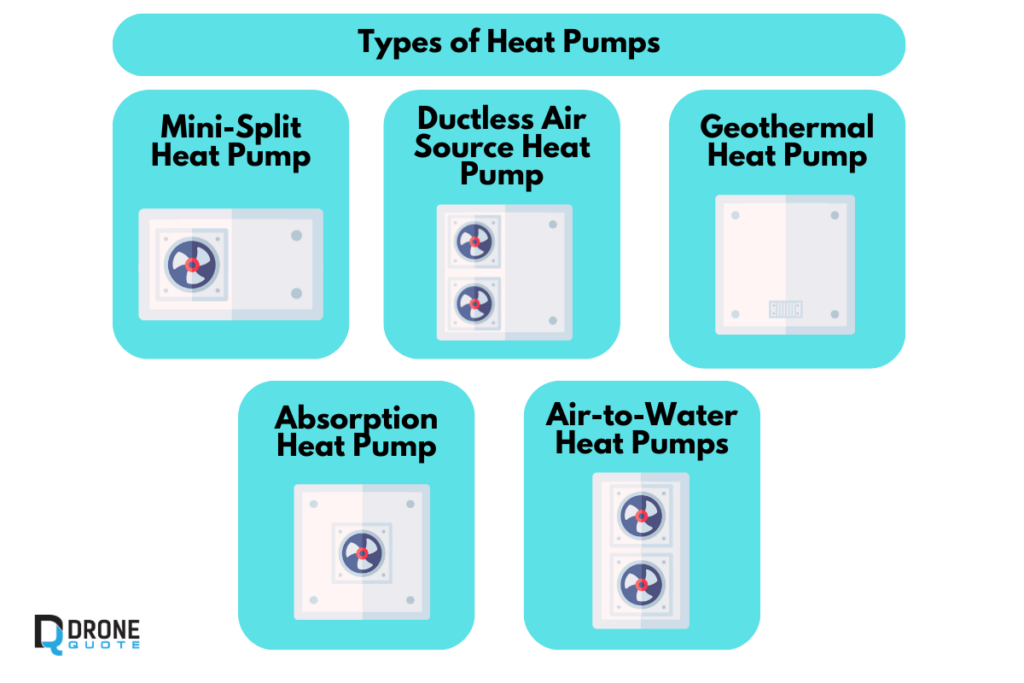Introduction
Are you ready to take control of your home’s temperature and save money on your energy bills? Look no further than the best heat pumps on the market. These innovative systems offer efficient heating and cooling while reducing your carbon footprint. With their advanced technology and reliable performance, pumps are ideal for any homeowner looking to upgrade their HVAC system. Get ready to say goodbye to high energy costs and hello to a more comfortable, environmentally-friendly home with the best heat pumps available.
Key Takeaways
| Heat pumps provide an efficient, eco-friendly alternative for heating and cooling, capable of reducing your energy bills and carbon footprint. |
| The variety of heat pumps available, from air-to-air to geothermal, offers solutions for every home, regardless of size or climate. |
| Installing a heat pump can be more cost-effective in the long run, despite the initial investment, thanks to their energy efficiency and lower operating costs. |
| With states moving towards a future dominated by heat pump technology, choosing a heat pump is not just a personal benefit but also a contribution to wider environmental goals. |
| The latest models, especially those highlighted for 2024, offer advanced features like smart controls, high SEER ratings, and compatibility with different climates, ensuring there's a high-performing, reliable option for every homeowner. |
What are Heat Pumps?
Heat pumps are an energy-efficient alternative to traditional furnaces and air conditioners. They use electricity to transfer heat from an excellent to a warm space, making them a versatile option for maintaining comfortable temperatures in your home. One of the main benefits is their ability to provide heating and cooling, which can help reduce the need for multiple devices. They are also known for their lower energy consumption than other heating and cooling options, making them a more sustainable choice for environmentally conscious homeowners. They can effectively keep your living space warm in the winter and cool in the summer by extracting heat from the air, water, or ground outside your home and transferring it indoors. Overall, they offer a reliable and efficient way to regulate the temperature in your home throughout the year.
Different Types of Heat Pumps
Air-to-Air Heat Pumps: The most common, they move heat between your home and the outside air. Moreover, warm air enters through a series of “blowers” or fan coil units to increase the air temperature in each room. They can decrease your electricity usage for heating by about 65% compared to electric resistance heating.

Ductless Air-Source Heat Pumps: Also referred to as mini-split, they are an excellent choice for houses that do not have ducts. They replace window units for cooling and are an alternative to radiator or baseboard heating.
Geothermal Heat Pumps: Ground-source or water-source achieve better efficiencies by transferring heat between your home and the ground or a nearby water source.
Absorption Heat Pumps: Also known as gas-fired, they utilize heat or thermal energy as their power source. The energy is taken from gas, propane, geothermal-heated, or solar-heated water. Since they use natural gasses, they are referred to as gas-fired pumps.
Air-to-Water Heat Pumps: Well-liked in new constructions, they move heat from the air to water. This is done using a hydronic distribution system that heats the home with in-floor heating or a series of radiators. This is similar to what a boiler does.
How They Work
A heat pump is a device that extracts heat from one location and moves it to another. It can be utilized for warming in the winter or cooling in the summer. They consist of three primary components: a fan, a compressor, and a heat exchanger. The fan pulls air into the heat exchanger, transferring heat from one side to the other. Then, the air is expelled from the heat exchanger to create a more relaxed atmosphere on one side. It can also be used for cooling rather than heating. When there is no temperature difference between the indoor and outdoor surroundings, heating and cooling can be achieved using only one unit.
Advantages
| Increased Heating Efficiency: | Heat pumps offer superior heating efficiency compared to typical electric heaters. |
| Economical: | They are generally more cost-effective than gas furnaces and electric heaters. |
| Security: | Heat pumps are a safer option than combustion-based systems. |
| Eco-Friendly: | They decrease carbon emissions and do not consume fossil fuels. |
| Reduced Maintenance: | Heat pumps require minimal maintenance compared to combustion heating systems. |
Drawbacks
| Expensive Initial Installation: | The upfront cost of a heat pump can be substantial. |
| Increased Power Consumption: | Despite their efficiency, heat pumps consume electricity, resulting in higher energy bills. |
| Vulnerable to Power Interruptions: | Heat pumps risk being affected by power outages. |
| Lower Efficiency in Cold Regions: | Heat pumps can function in freezing temperatures but are less effective in colder climates. |
| Optimal Choice: | Remember that the optimal choice depends on various factors such as your location, lot size, soil, and landscape. |
Best Time to Get Heat Pumps
When is the best time to get a heat pump for your home? The answer to this question largely depends on your specific needs, but generally speaking, the best time to buy one is in the spring or fall. This is because these seasons are less busy for installers, and you can often find better deals on a new model. A new one can provide a reliable heat or cooling system for your home and can make your home more comfortable throughout the year. According to consumer reports, some of the best brands to consider in 2023 include those with high-efficiency technology and reliability. Whether you’re looking for a ducted pump or a ductless mini-split pump, it’s essential to research and find the right one for your needs.
States that Accelerated the Wave
Your location also determines whether heat pumps are becoming the norm in modern households, specifically in your state. In fact, nine states have agreed to a memorandum of understanding stating that pumps must account for at least 65 percent of residential heating, air conditioning, and water heating systems shipped by 2030. These states, including California, Colorado, Maine, Maryland, Massachusetts, New Jersey, New York, Oregon, and Rhode Island, target 90 percent of such shipments.
Best Heat Pumps in 2024
- Top Smart-Enabled: The Senville LETO Series Mini Split Air Conditioner Heat Pump stands out for its Alexa compatibility and app control features. It offers heating, cooling, dehumidification, and a fan mode. Priced below $2,000, this unit delivers 24,000 BTU performance. For those with smaller spaces, Senville offers more economical models.
- Most Energy-Efficient: The Pioneer Air Conditioner WYS018G-20 Wall Mount Ductless Inverter+ Mini Split Heat Pump simplifies installation, making it an ideal choice for homeowners who avoid expensive professional setups. This model is designed for energy-saving DIY installation.
- Best for Large Rooms: The Cooper & Hunter Mini Split AC/Heating System, with a 16 SEER rating, showcases energy efficiency and requires professional installation. Models with up to a 22.5 SEER are available, promising energy bill savings.
- Top Central: The MRCOOL Universal Central Heat Pump Split System offers a versatile solution for replacing noisier condensers. Its durable design ensures operation in any weather, with a fireproof outdoor box.
- Best for Multiple Rooms: The Goodman 3-Ton Heat Pump System features a multi-position air handler and a high-capacity muffler for discreet operation throughout several areas, backed by a 10-year warranty.
- Top Energy-Efficient: The Senville AURA Series Mini Split Air Conditioner Heat Pump, with a 28 SEER rating and Alexa capability, is ideal for smaller areas, offering performance in extreme conditions without Energy Star approval, unlike the LETO series.
- Best Budget-Friendly: The AUX Ductless Mini Split Air Conditioner with Heat Pump, priced under $700, provides an affordable and effective heating and cooling solution for small to large spaces, featuring washable anti-fungal filters and easy installation.
Conclusion
Embracing new technology for your home’s HVAC system is not just an investment in comfort but also a step towards energy efficiency and environmental sustainability. Heat pumps stand out as a versatile, efficient solution for both heating and cooling needs, reducing reliance on traditional, less eco-friendly heating methods. With technological advancements, such as smart-enabled and high-efficiency models, there’s never been a better time to upgrade. Whether you’re looking for a system that caters to large spaces, multiple rooms, or even cold climates, the market in 2024 offers a range of options to suit diverse needs and budgets. By choosing the right device, homeowners can enjoy lower energy bills, reduced carbon footprint, and a comfortable living environment year-round.
Illuminate Your Life!
Don’t wait to make your home more comfortable and eco-friendly. Explore the best heat pumps of 2024 today and take a step towards a smarter, more sustainable home. Whether you’re interested in smart-enabled features, energy efficiency, or budget-friendly options, there’s one out there that’s perfect for your needs. Sign up and find the ideal pump to transform your home’s heating and cooling system.
Frequently Asked Questions
1. Are geothermal heat pumps suitable for my home?
They are a reliable option, especially for those looking for efficient heat transfer and high-efficiency technology.
2. What are the benefits of air-source heat pumps?
They offer efficient heat and cooling capabilities, making them a reliable heat pump option for many homes.
3. How important is it to have high efficiency?
A high-efficiency heat pump ensures optimal energy use and cost savings, especially in heating and cooling systems.






